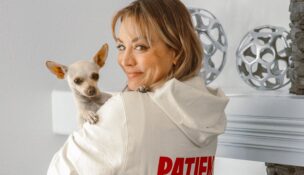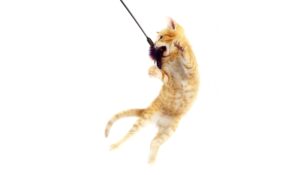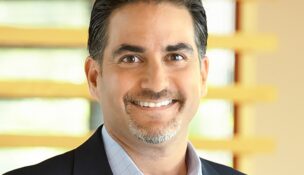Safety First: How Does the Industry Keep Pets out of Harm’s Way?
Alexandra Wepner//August 15, 2018//
Safety First: How Does the Industry Keep Pets out of Harm’s Way?
Alexandra Wepner //August 15, 2018//
Trust: it’s an essential component to the relationship between a retailer and a customer. And with trust often comes certain assumptions—namely, the assumption that products being offered in one’s favorite pet store are safe. Since retailers are the face of the pet industry, customers look to them to ensure their shelves are stocked with safe, trusted brands.
So how can retailers do their due diligence in regard to pet product safety?
For Tazz Latifi, owner of Petropolis, a retail store and grooming salon in New York City, the first step is getting to know the values of the humans behind the logos. She takes special care to “get to know the mothership.” When a brand does not meet her standards for transparency, she thinks twice about giving them a place on her shelves.
“When I look at brands like Dr. Harvey’s—they source everything organic, from companies that are making the raw materials [and] growing their own raw materials, and they can track back with each bag who has purchased it,” she said. “They’ll give you a tour of their facility and they’ll show you what they’re putting in their food. So when I recommend brands, it’s brands that are open about their processing like Answers Pet Food, Evermore Pet Food and Raised Right Pet Foods.”
How It’s Made
Even if a retailer is able to gain access to the team behind a pet product, it’s hard to know where to start when it comes to questions about pet food safety. But what better way to learn the ins and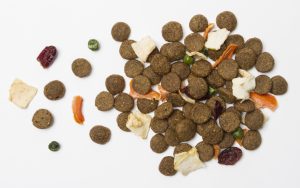 outs of pet food manufacturing than to create a pet food yourself? American Nutrition is a company involved in co-manufacturing and private label pet food and treats. The company is proud of its own food safety program and has even compiled a short list of questions that retailers and pet food brands should be asking of prospective pet food manufacturers.
outs of pet food manufacturing than to create a pet food yourself? American Nutrition is a company involved in co-manufacturing and private label pet food and treats. The company is proud of its own food safety program and has even compiled a short list of questions that retailers and pet food brands should be asking of prospective pet food manufacturers.
According to American Nutrition, the first question on this list is, “What is included in your food safety program?” A supply chain management program, sanitary transportation methods, current Good Manufacturing Practices (cGMPs), Standard Operating Procedures (SOPs), Sanitation Standard Operating Procedures (SSOPs), regular audits and a culture committed to safety are all named as important parts of an effective pet food safety program. Measures to prevent cross-contamination are also highlighted.
According to Dr. David Nyachuba, director of food safety at American Nutrition, the company’s own pet food safety program is developed by a team of “members with PhDs and master’s degrees, members from several different food-related industries, as well as many years’ experience in manufacturing safe, quality pet food.” It incorporates GMPs and has a Safe Quality Food (SQF) Certification, Level 3. The Safe Quality Food (SQF) Institute is a division of the Food Marketing Institute, which advocates on behalf of the food retail industry. A Level 3 Certification denotes a comprehensive food safety and quality management system at the highest level attainable.
“American Nutrition’s pet food safety standards go above and beyond regulatory basics. We consistently improve upon these programs, as well as the people that carry them out,” Dr. Nyachuba said. “Within each plant, there is a designated SQF practitioner, preventative control qualified individuals (PCQIs), in addition to HACCP [Hazard Analysis Critical Control Point, a food safety management system] and basic food safety training for manufacturing employees.”
When Recalls Happen
According to Dr. Nyachuba, American Nutrition’s food safety program was built with “regulatory guidance from government, industry and globally recognized, risk-based preventative approaches.” One of the foremost government agencies charged with monitoring pet food safety is the Food and Drug Administration (FDA).
Founded in 1906, the FDA ensures that foods are safe, produced in sanitary conditions, free of harmful substances and truthfully labeled. All food manufacturers are subject to inspection and enforcement of FDA regulations.
In the event that a pet food is found to violate FDA regulations, the agency follows up to work with manufacturers to ensure that the public is aware of any issue that poses a risk to public health, and the manufacturer is required to take corrective steps. Enforcement methods range from warning letters to product seizure and injunctions, employed on a case-by-case basis.
When it comes to the dreaded recall, Latifi, as a retailer, has a realistic and composed perspective.
“Recalls happen; you have to go back to the integrity of the ‘mothership’ and what they’re open about and what they’re willing to do—are they taking all measures possible to make sure their product is OK?” she asked. “And you know, some things are just beyond these companies’ control… there’s so much to talk about with recalls. You start there and see how they handled it.”
The team at American Nutrition seems to agree. Whether or not a manufacturer’s product has been recalled is the third question in American Nutrition’s short list of important questions for pet food manufacturers. A brochure produced by the company titled “Pet Food Safety: Going Above and Beyond Common Safety Practices” had the following take: “If a recall has been issued, this may initially throw up a red flag. Before scratching the manufacturer off your list, however, ask what happened and what has been done to ensure it doesn’t happen again the future.”
Hemp: The New Frontier
For much of human history, hemp has been used industrially. However, the recent cultural shift surrounding hemp-extracted cannabinoids has sparked an explosion of CBD wellness brands in the pet market.
One such company, Therabis, was founded by Dr. Stephen M. Katz, who created the formulas 10 years ago while working at the Bronx Veterinary Center in New York City. The products, featuring hemp-extracted cannabinoids, aim to address challenges like joint health, allergies, anxiety and overall wellness in pets.
With an almost entirely new segment emerging in the pet market, safety is at the forefront of both retailers’ and pet owners’ minds. According to J. Kurt Forstmann, general manager at Therabis, the products are manufactured in two GMP-certified and -compliant facilities. Even further, the company conducts a slew of its own tests to make sure what pet owners see is what they get.
“The GMP facilities also undergo regular FDA audit to ensure that they are using the best practices in their manufacturing,” said Jim Sharkey, PhD., chief scientist at Therabis. “All of our ingredients  come with certificates of analysis [COA] verifying their safety. When it comes to our hemp extract, we send that out for additional testing upon receipt to verify that the COA is correct. And then, once everything is mixed in the final product, we test again to ensure that our dosage is correct and that they’re again free from microbiological contaminants… and also hold samples in reserve.”
come with certificates of analysis [COA] verifying their safety. When it comes to our hemp extract, we send that out for additional testing upon receipt to verify that the COA is correct. And then, once everything is mixed in the final product, we test again to ensure that our dosage is correct and that they’re again free from microbiological contaminants… and also hold samples in reserve.”
The Therabis website has an educational section, and a “huge binder of tests” is available upon request, as are training services for retailers new to offering the products. The company is currently participating in a University Stage One Clinical Trial, the results of which are expected to be published next year.
“For us, it’s transparency,” Forstmann said. “As long as you’re transparent on your testing and you provide that stuff when they ask, that gives retailers a comfort. So we share all of that stuff when they ask.”
A Trustworthy Track Record
For hard goods, the vetting process on the retailer side seems to become a bit more difficult. Latifi names Planet Dog, West Paw, Beco and SodaPup as brands she trusts. She tries to buy “Made in the USA” when she can, but does make exceptions.
“I tend to pick companies that have a history of making good products… like Kong. I stick to the basics,” Latifi said.
A company’s track record is yet another useful tool for retailers in determining a brand’s trustworthiness. Based in Germany, flexi makes claim to a history of making good products. The company credits its founder, Manfred Bogdahn, with the invention of the retractable leash in 1972.
Nearly 50 years later, and flexi is still setting the standard for leashes worldwide, manufacturing them from start to finish under one roof in a family-owned business located near Hamburg.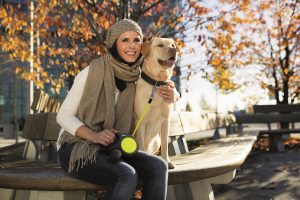 According to Sylvie Geffrelot, area sales manager at flexi, each model is assembled by hand and undergoes more than 100 quality checks before reaching consumers.
According to Sylvie Geffrelot, area sales manager at flexi, each model is assembled by hand and undergoes more than 100 quality checks before reaching consumers.
“By focusing on the development and manufacture of retractable leashes for over 45 years, flexi has acquired such a know-how that its quality and functionality can’t be matched by our competitors,” she said. “Today, we can absolutely confirm with pride that our mechanism has a 10 times longer durability than leashes made in China.”
The new flexi NEON is ideal for night time walks, as its neon components allow for added safety through visibility. There’s reflective components on the lead casing, the break button and on the 16-foot retractable tape. The largest version will work for dogs as large as 110 pounds. The Giant XL leash, also with neon components, is designed for especially large and strong dogs.
Setting the Standard
At Sleepypod, safety is not only a top priority—it’s inherent to the brand. According to the company, every Sleepypod carrier and safety harness has received a top safety rating from the Center for Pet Safety, which is a registered 501(c)(3) non-profit safety science organization that acts in research and consumer advocacy.
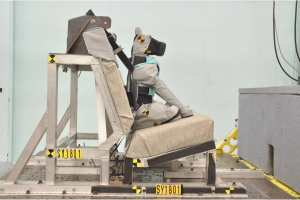 “Sleepypod crash tests all of its carriers and safety harnesses at U.S., Canadian and European standards for child safety restraints,” said Michael Leung, Sleepypod’s co-founder and lead product designer. “During the test, the pet safety restraint must be able to keep the pet from sliding forward and off of the seat bench while controlling rotation.”
“Sleepypod crash tests all of its carriers and safety harnesses at U.S., Canadian and European standards for child safety restraints,” said Michael Leung, Sleepypod’s co-founder and lead product designer. “During the test, the pet safety restraint must be able to keep the pet from sliding forward and off of the seat bench while controlling rotation.”
The Sleepypod mobile pet bed is three products in one: a carrier, a pet bed and a safe car seat. It has a removable mesh dome, seat belt straps and removable, ultra-plush bedding that is machine-washable. The rest of the Sleepypod catalog is made up of the Sleepypod Air, the Atom pet carrier, and the Clickit Sport and Terrain harnesses.
The company even has proprietary crash test dogs and cats—DUKE 2.0 and CLEO 2.0, respectively—and makes crash tests available to consumers on its YouTube channel.
“High safety standards help boost consumer confidence,” Leung said. “By selling products that are proven to be safe, it will provide consumers extra assurance when strapping in their pets for a ride.”
Better Safe than Sorry
Safety is, admittedly, a complicated topic in the pet industry. Firstly, there is no single prevailing standard that everyone agrees makes a product “safe”—and there probably never will be. It’s also hard to confirm, in every single case, that claims made in the market are truthful. As Latifi says, “You have salespeople who come in and give you a lot of words, but if I was to show up at their facility, will they be able to meet all the claims they make?” And to that end, there are so many moving parts in the lifetime of a pet product, from “square one” to shelves, that it’s nearly impossible to assign complete responsibility for safety to one person or group only.
And even if that were possible, what good would it do?
In reality, it’s imperative that everyone does their part: that industry associations and/or government agencies set universal standards and enforce them; that manufacturers comply by implementing comprehensive and transparent safety procedures; that retailers do their research and remain alert. The pet market is at its healthiest when all involved work together in an open and honest manner, employing their best preventative measures and owning mistakes when they happen.









